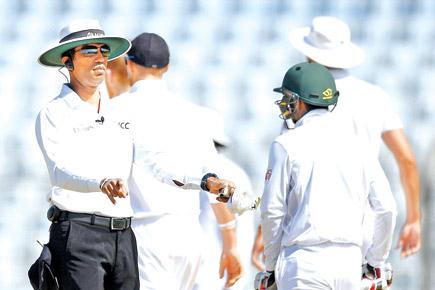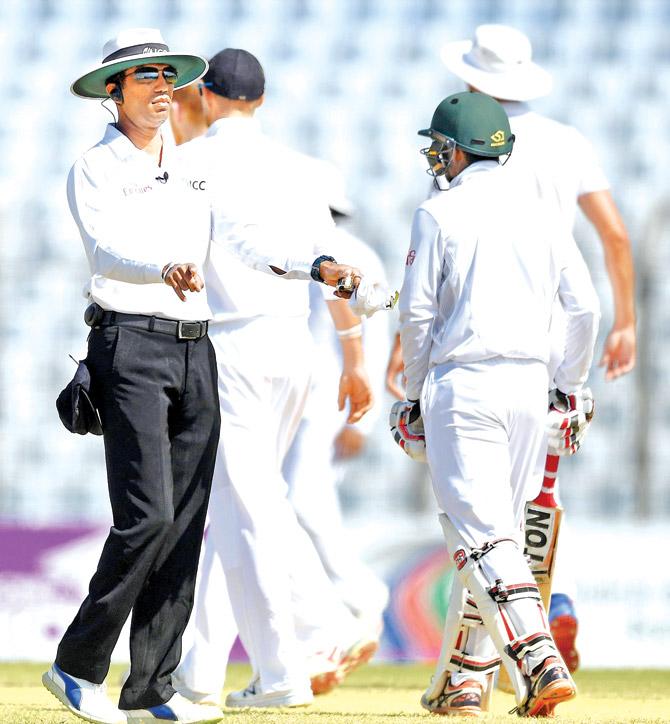As BCCI decides to introduce referral system in the upcoming Test series against Englishmen, Lankan umpire for Rajkot Test is likely to feel the heat after 13 of his 27 decisions were overturned in B'desh vs England series

Umpire Kumar Dharmasena signals for a review on Day Five of the first Test between Bangladesh and England at Zohur Chowdhury Stadium in Chittagong on October 24. Pic/Getty Images

Umpire Kumar Dharmasena signals for a review on Day Five of the first Test between Bangladesh and England at Zohur Chowdhury Stadium in Chittagong on October 24. Pic/Getty Images
ADVERTISEMENT
There will be an element of the perfect storm for Sri Lankan umpire Kumar Dharmasena in Rajkot where India have agreed to adopt the Decision Review System.
But the Sri Lankan official, due to stand in next week's first Test of five between England and India and the second in Vizag before reverting to third-umpire status in Mohali, can count on the support of his employers at the International Cricket Council (ICC).
Also Read: IND vs ENG: Moeen Ali, Adil Rashid are safe in India, says ECB
Dharmasena bagged an unenviable record by the end of England's series against Bangladesh last weekend, in which 13 of his 27 decisions referred to DRS were overturned with the help of technology.
He moves on, like England, to India and will doubtless find himself under scrutiny again after the hosts' agreement to use DRS on a trial basis. Geoff Allardice, ICC's general manager, confirmed the world governing body welcomes India's belated adoption of a system which has been in use in an increasing majority of bilateral series over the past seven years.
He also pointed out that, although overturned decisions are inevitably among the information taken into account in the ICC's annual assessments of their elite umpires, no snap decisions will be made about any official on the basis of one performance.
Conditions for both Tests during England's 1-1 draw in Bangladesh favoured spin and made on-field calls tough, a point stressed by Allardice.
'DRS almost perfect'
"Often DRS delivers its best results when the pitches are turning or seaming, and umpiring is difficult," he said.
"Generally, in DRS series we deliver 98 to 97% correct decisions and that provides consistency, whether conditions are difficult for (on-field) umpires, or the umpire is having a good day or a bad day.
"It's quite a test for an umpire in those conditions - because you can often be making good umpiring decisions that are later proven to be incorrect ... (for example) getting a glove on a sweep shot that then means an lbw is overturned ... as happened a few times."
Those specifics will all be taken into account by the ICC.
"Sometimes you can make what is quite an understandable umpiring decision, and it be overturned as incorrect. You don't get as concerned about those types of decisions as ones where there is a misjudgment or obviously a concentration error. We make those judgments when we go through the assessment process," Allardice added.
Occasional adversity is an occupational hazard for any umpire, and Allardice stresses it is the response in the short and long term which is key.
Immediate result
"One of the skills of an umpire at all levels, whether there is DRS or not, is his resilience to mistakes. In the old days, you used to find out when you came off the field whether you'd made a mistake or not ... now that feedback is a little bit more immediate, he said.
"Being able to process that feedback about your decisions, and then try to either use it to improve your decision-making or to not let it affect your decision-making is the thing that determines an elite umpire from the next level down."
Dharmasena reacted as the ICC hoped, even as a string of his tightest line calls were being dissected as the ball continued to turn sharply in Chittagong and Dhaka.
"You could even see, during the two Test matches that Kumar did on the field, that he was reacting in a positive way - even though he had a number of decisions overturned," said Allardice.
 Subscribe today by clicking the link and stay updated with the latest news!" Click here!
Subscribe today by clicking the link and stay updated with the latest news!" Click here!







